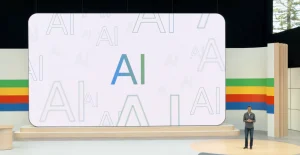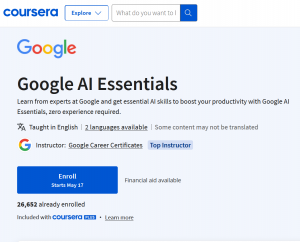With the recent Google I/O developer’s conference seemingly entirely focused on developments in artificial intelligence, and a hundred self-described take-aways from the 2024 conference highlighted by AI moments large and small, the company says its numerous AI announcements have something for everyone.

Google CEO Sundar Pichai on stage at the Google I/O 2024 developer’s conference with one of many AI-related announcements. Google image.
Google unveiled its new AI assistant of the future, dubbed Project Astra, in which video and voice is used to deliver contextual responses to questions. Several AI features are being implemented in Android, such as a new feature called TalkBack that’s acts like an accessibility tool for those who are blind or have limited eyesight, describing photos and the like.
And, with generative AI on board, Google Veo can be used to create realistic, detailed 1080p videos based on your request. Meanwhile, Imagen 3 can generate images based on text prompts.
Big search news from the conference, too, and also announced via a post on X, about new AI-organized results and overviews from searches (and, interestingly, a new web filter to get just text-based links).
But even prior to the event, Google was underscoring its commitment to AI by releasing AI Essentials – a new online educational course designed and developed by Google to help individuals and companies understand AI, develop AI skills, and apply AI advantages to their careers and businesses.
As fast as artificial intelligence has become a part of our lives, many organizations still struggle to understand AI and use it effectively. There is an identified lack of skilled, trained, and experienced practitioners, and Google’s educational initiatives are part of the company’s desire to close the AI skills gap it sees.
 So the new AI Essentials course is as accessible as possible: it’s offered through Coursera, the huge U.S.-based online learning company. The course is self-paced, available in English with additional languages coming. Google is also working with partners to providing funding assistance where needed, and job search support where possible.
So the new AI Essentials course is as accessible as possible: it’s offered through Coursera, the huge U.S.-based online learning company. The course is self-paced, available in English with additional languages coming. Google is also working with partners to providing funding assistance where needed, and job search support where possible.
In about 15 hours, enrollees – no previous experience with AI is required – are shown uses of generative AI tools, given time to practice writing effective prompts, informed about using AI responsibly and how to mitigate its biases and inaccuracies, and much more.
AI experts from Google present course materials, handy tips on and hands-on experiences with a variety of AI tools in a series of five modules: Introduction to AI, Maximize Productivity with AI Tools, Discover the Art of Prompt Engineering, Use AI Responsibly, and Stay Ahead of the AI Curve, which bravely discusses the future of AI and how to stay up-to-date with all the latest AI developments.
Generative AI, for example, is a specific form of AI that focuses on creating new content like text, images, or other media based on examples it’s been trained on. Some AI tools accept text or speech as instructions and input, while others can also take in videos or images.
As such, AI instructions, also called prompts, do not require coding skills but rather conversation, so during Google AI Essentials, students practise with a tool like Gemini, the AI chatbot once known as Bard.
Each module has video clips, text and articles, and student assignments and activities to boost engagement and learning.
Anyone who uses Google products like Gmail, Sheets, or Google Docs on a regular basis will learn how to automate their work and save time on regular procedures, and those without such familiarity will be introduced to advantages AI-enabled tools can bring to the workplace.
As Sabrina Geremia, Vice President and Country Managing Director, Google Canada, has learned in her more than 10 years leading teams who work with one form of AI or another, “[C]ontinuous learning is foundational.
“Not everyone needs to know how to build a Large Language Model, but learning how to work alongside these new technologies is critical. I took AI Essentials last week,” she described, “and found the course accessible, providing simple and concrete examples that highlight how you can use AI at work and in everyday life. The course was efficient, and something I could tackle in a week, during my free time.”
The course offers insights into how experts at Google use AI, particularly Gemini with Gmail, Docs and others, in their daily work lives as a powerful way to maximize productivity. (Of course, there is a focus on Google tools and products, so for those already familiar with AI tools like ChatGPT, Claude, Copilot and others, it is a window into how specific Google tools are used.)
As mentioned, there is an initiative connected to the Google AI Essentials course to grant scholarships to individuals from underrepresented communities, as Geremia described in an e-mail to WhatsYourTech.
“The work to get AI Essentials into the hands of more Canadians is well underway. In addition to offering the course through Coursera, Google is working with non-profit groups Canada Learning Code, ComIT, Digital Main Street, FirstWork, and Vector Institute to provide scholarships to individuals in their networks from underrepresented communities. The great work they’re doing helps bridge the opportunity gap, upskill more diverse talent, and allows more people to understand how AI can make them more efficient at work and in everyday life.”
Google AI Essentials costs $66 CDN on Coursera. Once enrolled, students have access to all course materials, including videos, activities, readings, and graded assessments.
At the same time as it released AI Essentials, Google also launched a teacher-specific version, Generative AI for Educators, in Canada. Also a self-paced course with no previous experience required to take, it was designed to help teachers save time on everyday tasks, personalize instruction to meet student needs, and enhance lessons and activities in creative ways with generative AI tools.
As enthusiastic and supportive as the course curriculum is regarding developments and potentials of artificial intelligence, there are also some serious, sobering and balancing perspectives:
“AI, to be clear, is not perfect!”
That’s the cautionary introduction to the Use AI Responsibly module, presented by members of Google’s responsible innovation team.
“Humans are creative, logical, and compassionate. We have critical reasoning abilities, and a contextual understating of our environment, that AI systems lack.”
AI is a compliment to human skills and abilities, not a replacement, the segment informs, as it goes on to address known biases in AI models, the types of harms associated with such biases, how important critical human thinking and responsible decision making are in such as technological world, as well as advice on how to maintain privacy and security while experimenting with AI.
All essential lessons to learn.
-30-



